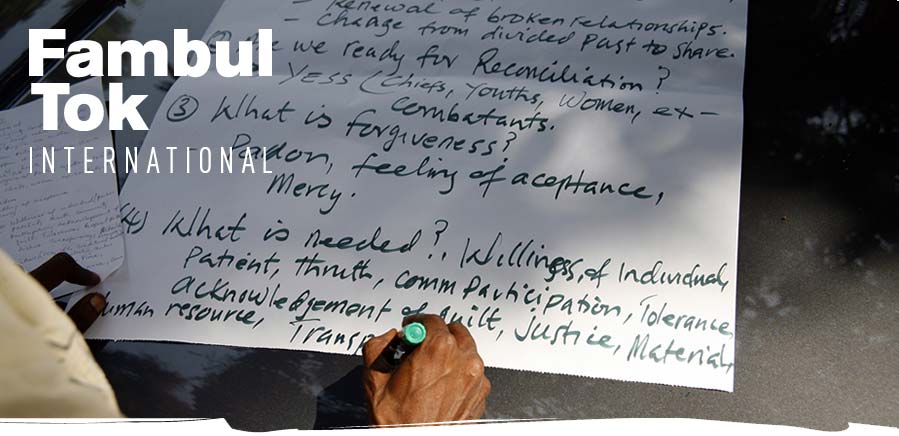What is Fambul Tok?
An Overview
Fambul Tok (Krio for "Family Talk") emerged in Sierra Leone as a face-to-face community-owned program bringing together perpetrators and victims of the violence in Sierra Leone's eleven-year civil war through ceremonies rooted in the local traditions of war-torn villages. It provides Sierra Leonean citizens with an opportunity to come to terms with what happened during the war, to talk, to heal, and to chart a new path forward, together.
Fambul Tok is built upon Sierra Leone's "family talk" tradition of discussing and resolving issues within the security of a family circle. The program works at the village level to help communities organize ceremonies that include truth-telling bonfires and traditional cleansing ceremonies-practices that many communities have not employed since before the war. Through drawing on age-old traditions of confession, apology and forgiveness, Fambul Tok has revived Sierra Leoneans' rightful pride in their culture.
Developed and first implemented by the Sierra Leonean human rights organization, Forum of Conscience, and the U.S.-based operating foundation, Catalyst for Peace, Fambul Tok incorporated as an international non-governmental organization, Fambul Tok International (FTI), in late 2009, with the program in Sierra Leone as its flagship project. Fambul Tok embodies the most leading-edge processes of consultative program design and "accompaniment" models of partnership-between in-country and outside organizations, as well as between implementing organizations and the communities of implementation. The program requires community ownership at every level. In so doing, it charts a new path for the international community in post-conflict reconstruction.
What is Fambul Tok? Interviews with Paramount Chief Alfred Banya, chair, Moyamba District; and Michaela Ashwood of the Peace Mothers GroupThe Process
Fambul Tok is rooted in the understanding that reconciliation is a process and not a one-time event, and works with communities on a long-term basis. It ensures full community engagement-through initial consultations to determine whether people are ready to reconcile, and subsequently through community-led preparations and outreach for Fambul Tok ceremonies.
Following the ceremonies, Fambul Tok works with the communities to organize activities to support and sustain the reconciliation process. These have included radio-listening clubs, football games, and even village-initiated community farms-projects through which newly reconciled individuals come together for the good of the community.
Originally conceived as a chiefdom-level program that would involve 161 ceremonies around the country, Fambul Tok evolved to meet the needs of fellow Sierra Leoneans who have asked for ceremonies to be held at the much smaller level of village groupings-known as "sections"-that will involve thousands of ceremonies to be held over the next several years.
This community-healing process of reconciliation and forgiveness addresses the roots of conflict at the local level, and restores dignity to the lives of those who suffered most directly from violence. The work helps war-affected individuals reflect on the past and move forward in ways that avert the renewal of aggressions. By grounding reconciliation in traditional practices, it also helps create healthy communities capable of building new foundations of peace.
Sierra Leone's signature contribution
Fambul Tok is a distinctly Sierra Leonean initiative. It is not rooted in Western concepts of blame and retribution, but rather in African communal sensibilities that emphasize the need for communities to be whole, with each member playing a role, if peace and development are to be achieved for the nation at large.
Sierra Leone is entering a new era as the final phases of internationally driven institutions such as the Truth and Reconciliation Commission and the Special Court are coming to a close. Fambul Tok is stepping up to meet the demands of this new phase by broadening its campaign to all regions of Sierra Leone. We believe that the time for peace has come.
Founder/Publisher/Editor: David McGee
Contributing Editors: Billy Altman, Laura Fissinger, Christopher Hill, Derk Richardson
Logo Design: John Mendelsohn (www.johnmendelsohn.com)
Website Design: Kieran McGee (www.kieranmcgee.com)
Staff Photographers: Audrey Harrod (Louisville, KY; www.flickr.com/audreyharrod), Alicia Zappier (New York)
E-mail: thebluegrassspecial@gmail.com
Mailing Address: David McGee, 201 W. 85 St.—5B, New York, NY 10024



